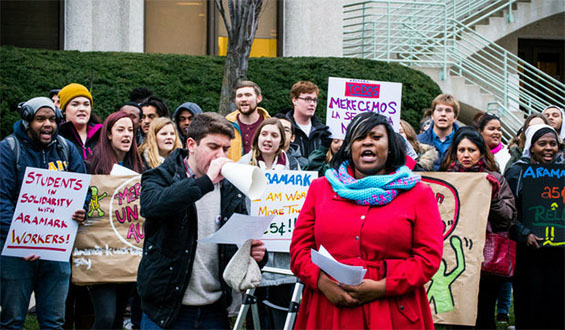
A disciplinary hearing was held earlier this week for four Loyola University Chicago students who had been accused of going too far with an on-campus demonstration for workers’ rights.
The incident in question occurred during a demonstration held on November 20 in an effort to call attention to the need for increased wages and health benefits for food service workers. On that day, students joined Aramark dining hall workers for an outdoor protest.
The students in question were said to have approached a manager for Aramark, the company that runs Loyola’s cafeterias, along with 40-60 other students, and voiced their demands.
According to University spokesman Steven Christensen, the students “disrupted operations and targeted and harassed a member of the Aramark staff,” in addition to the possibility of breaking school rules through “disruptive and disorderly conduct” as well as “harassment and bullying.”
Students and Catholic leaders came together at the hearing to speak out against the accusations made. Michael Fasullo, former president of the university’s student government, who resigned after school officials told him he could face disciplinary measures as a result of the protest, spoke of a contradiction at the school. He said he understood the mission of the school to be “humanity through learning, justice and faith,” he said that mission apparently did not apply to workers attempting to unionize, reports Manya Brachear Pashman for The Chicago Tribune.
ARISE Chicago worker Luke Sullivan came to show his support, bringing with him a letter signed by 50 Chicago clergy members demanding that all accusations be immediately dropped.
Alumna Mary Kay Devine spoke to Linze Rice for DNAInfo, saying that while she had donated to the school each year, she would seriously reconsider doing so in the future if the accusations were not dismissed.
Loyola senior Lilian Osborne, one of the four accused students known as the “Loyola Four,” maintains that the students were simply holding a “respectful dialogue” with the manager when there was a lull in activity between lunch and dinner.
She added that precedent would be set by the University if it carried out formal punishments, which could cause future students interested in social justice to rethink attending the school. She said it could also result in fewer students being willing to fight for workers.
“We believe that we’re staying strong in our convictions that workers deserve dignified working conditions and respect and we’re continuing to call on Loyola to fulfill its Jesuit mission,” Osborne said. “It’s not easy to follow social justice dictates, but the university needs to rise to the occasion and do what is difficult and what it right.”
Kristin Trehearne Lane, a spokeswoman for Loyola, said that while protesters were not in trouble for participating in the demonstration, there had been reports of the four students in question entering the dining hall and disrupting service in order to target and harass a member of the University community.




